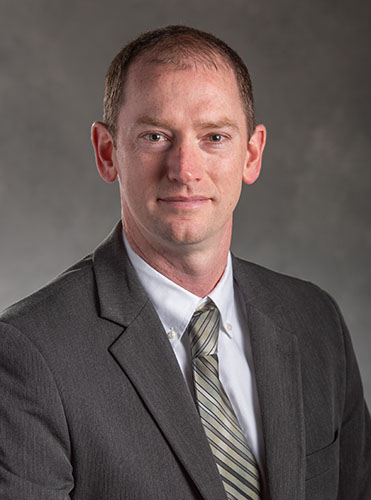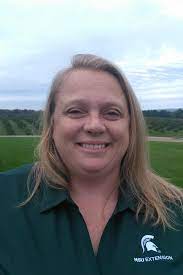MSU supports dairy industry through COVID-19
Dairy team assists with government assistance programs, business planning

As Michigan’s dairy farmers adjusted to numerous challenges brought on by the novel coronavirus pandemic, the Michigan State University (MSU) dairy team set in motion a series of programs and outreach efforts to ensure the state’s dairy producers had the tools needed to survive and thrive over the past year.
“In addition to existing issues, the pandemic and its ripple effects brought added challenges to farmers over the past year,” said Sheila Burkhardt, senior director of member and government relations for the Michigan Milk Producers Association (MMPA). “Continued uncertainty and market volatility have been pressing concerns. COVID-19 has directly impacted most communities, including the health and well-being of many individuals. Farmers have worked to continue producing milk – a 365-day-a-year job – while still trying to keep their families and employees safe and healthy.”
MMPA and MSU partner to provide resources to the state’s farmers and the partnership proved to be vital in supporting the industry.
“MMPA continues to value the resources and programming MSU provides to farmers and the agriculture community. We have continued open communication with MSU about the issues facing dairy farmers and the role of MSU in building a successful future for the dairy community. MMPA and our members have found the continued outreach efforts, including virtual events, valuable resources. MSU programs continue to play an important role in supporting dairy farmers and farmers appreciate the ability to still count on MSU, even if the formats have been adapted,” Burkhardt said.
MSU’s role
When Barry Bradford took the role of C.E. Meadows Endowed Chair for Dairy Management in January 2020, his primary goal was to enhance collaboration among MSU’s various dairy researchers, faculty and Extension specialists.
Just a couple of months into his tenure, COVID-19 hit Michigan and the state’s dairy industry.

Communication was key for Bradford, who was encouraged by how well MSU’s dairy team came together. They opened up lines of communication with producers, as farm visits were restricted and MSU shifted the bulk of its programs to virtual settings.
“We put a huge priority on online communications,” Bradford said. “We tried a variety of different web-based outreach to find ways to try to meet producer needs.”
In addition to forcing the team to focus more on digital communication, Bradford also saw a shift in the information producers were seeking at the onset of the pandemic.
While the dairy industry typically relies on MSU for research and providing farmers the most up-to-date information, this was different. As the pandemic threatened milk prices and market stability, producers looked to MSU’s dairy team for help accessing government programs and business plans to help survive inconsistent dairy markets.
“A lot of the government programs during COVID-19 were hugely helpful to the dairy industry, and our goal was to make sure all of our farms had access to those programs and could apply when relevant,” Bradford said.
To address the financial concerns of the state’s dairy producers, MSU Extension, MSU Animal Science, MSU AgBioResearch scientists and MSU’s Department of Agriculture, Food and Resource Economics (AFRE) came together to work with producers of all sizes to secure their business models and plan for an unsteady future.
“We’ve talked as much about business management as anything over the past year,” Bradford said. “Our traditional link to the industry has always been heaviest in Animal Science, where we're all trained as biologists. We take expertise in applied biology to farms that are trying to make a profit, but we're not necessarily deeply trained in financial analysis, so we have been collaborating with experts in other departments and in the Extension teams who are on the economic side to try to bring forward more coordinated programs for dairy farms.”
Bradford partnered with AFRE and MSU Extension to offer a virtual presentation on strategic business planning during the 2021 Great Lakes Regional Dairy Conference. The session discussed strategic business planning for dairies, including a panel of producers who experienced significant changes in their own dairy businesses.
The dairy team also placed an emphasis on producing videos and podcasts to provide up-to-date information to consumers and producers.
AFRE supports dairy industry
AFRE assistant professor Melissa McKendree, along with several colleagues within the department, was key in MSU’s COVID-19 response as a member of the Farm Business Management Team.
McKendree’s research is focused on issues related to the livestock industries and her outreach areas include livestock economics, producer decision making, consumer choice behavior and food marketing.
.png?language_id=1)
“We saw a flood of government relief programs out there. Some of those were specifically targeted for dairy producers and then some of them were much broader. Within AFRE and within MSU Extension, the farm business management team did quite a bit of work helping inform producers about those programs and helping them fill out those applications,” she said.
AFRE also supports producers through the MSU TelFarm program. The TelFarm system of farm financial record keeping is a program available from MSU Extension's Farm Business Management Educators. It is an educational service program designed to assist farmers with their farm financial records and decision making.
“What's nice about the TelFarm system, besides the one-on-one work that we do with producers, is that we also provide benchmarking reports so producers can compare how they're doing to other farms in the state,” McKendree said. “It’s a great tool to give them a barometer and think about areas where they can improve. Through the TelFarm System, we were able to walk producers through programs like the Paycheck Protection Program and help them understand how you put programs like that into your accounting system.”
The Farm Business Management Team worked with several dairy farmers who, because of shifts in demand during the pandemic, were looking for potential opportunities to adjust their business model to reflect the challenging markets. The MSU Product Center also worked with dairies throughout the pandemic to help with business planning, McKendree said.
“Many producers are trying to be more innovative and think about diversifying their operations, so with Barry Bradford, we hosted a strategic planning session at the Great Lakes Dairy Expo that really focused on stepping back and really understanding what farmers’ goals are for their dairy and what financial information they need to know so that they can use it to help make those investment decisions.”
McKendree said the cooperation between various MSU departments and outreach units has been crucial to helping dairy producers find information and assistance through the pandemic.
“Barry's idea of bringing all the departments together has been very beneficial and helpful. The Great Lakes Dairy Conference presentation was a direct product of the work that Barry's been doing – finding collaborations and ways we can bring more people together on these issues. That was a great way for us to collaborate and provide producers with some strategic management tools.”
McKendree values her appointment which covers research, teaching and outreach, because it “provides me the opportunity for feedback loops.”
“There is always information I learn from producers. We might be delivering content to dairy farmers about a program or research, but at the same time, we’re learning from them and understanding what their problems are so that we can go back, do more research, do more outreach work and help them with those problems,” she said.
McKendree said MSU’s versatility and wide-range of expertise allows them to not only address issues on an individual farm level, but also lets them solve larger problems facing national and global agricultural issues.
“We often deal with what we call ‘wicked problems,’ and it's not just one discipline that can address those problems,” she said. “We need expertise from many of our different areas, and a lot of times what happens on these multidisciplinary teams is that you're all talking about the same issue, but you're using different language. By having these regular conversations within all of our disciplines, we can stay in contact and that helps our communication be much quicker and more efficient in the future.”
Outreach efforts
MSU Extension specialists Stan Moore and Corey Clark worked directly with producers during COVID-19 to help them deal with the ever-changing programs and government assistance benefits as well as assisting with economic and production issues.

“One of the most difficult things for us has been just trying to keep up with all of the farm programs and almost daily changes that have occurred in the industry over the past year,” Moore said. “On one hand, they've been a great help to dairy farmers, sometimes approaching significant dollars per cow. But the challenge has been ‘what are the rules today? what are they tomorrow? And how do I apply?’”
MSU Extension wanted to ensure that every dairy operation in the state was able to access all the resources available to dairy farms during the pandemic.
“I think one of the issues we dealt with was access to information by some of our farms on things like the Paycheck Protection Program and a lot of COVID-19-related programs. Many farms didn't have access to the information they needed, and MSU Extension was able to provide it,” Clark said.
Clark and Moore credit MSU Extension’s flexibility in shifting to virtual outreach efforts to best assist producers.
“The ability to spread information through our programs statewide using virtual platforms has allowed our specialists to cover the whole state with COVID-19 information in a way that I think would have been harder had we not been working virtually,” Clark said.
MSU Extension created a coronavirus response page on its business management website to help producers keep up with ever-changing programming and regulations.

“We serve as a conduit from the university to our producers, but at the same time, we serve as conduit back from producers to the university. Our virtual communication has allowed us to stay on top of what's actually happening out there with our producers and what we need to work on to help producers in the field,” Clark said. “I think that's been a critical role for us to serve.”
Work with MMPA
MSU’s partnership with MMPA allows the university to reach more producers and that partnership was key in making sure farmers across the state received the support needed to get through the pandemic.
MMPA provided resources and information on COVID-19 protocols to implement on their farms and encouraged employees and members to get vaccinated for COVID-19 when the vaccine became available to dairy industry employees in March.
MMPA also provided input on a white paper from the Department of Supply Chain Management and AFRE at MSU, called “Supply Chain Resiliency: Post Pandemic Outlook for the Agri-Food Industry.”
The white paper included the impact of COVID-19 during the early days of the pandemic when demand in the food service industry dropped sharply and retail demand surged. The paper cited “strong supplier-buyer relationships that exist in the state” as a potential reason that little milk dumping occurred in Michigan unlike elsewhere in the country.
The paper’s findings and development of a supply chain resilience framework involves “building redundancies and flexibility in the supply chain,” strategies that will be valuable to MMPA and our partners into the future, Burkhardt said.
“As the pandemic limited options for in-person events, MMPA partnered with MSU Extension to develop a virtual field day. The field day will feature pre-recorded farm visits conducted by MSU Extension Educators Paul Gross and Dean Baas,” Burkhardt said.
The event includes discussions on topics such as seed selection for forage and conventional cover crops, manure management, planting and harvesting methods, and the practical application of cover crops in a dairy crop rotation.
Burkhardt hopes 2021 will offer a return to normal for many of the state’s dairy farms.
“Economically, farmers have been impacted by dramatic price swings and continued uncertainty and economic stress. However, farmers were assisted by government aid programs and, in recent months, markets have strengthened and are regaining confidence as the country opens back up. Today dairy farmers are eagerly anticipating the return to more normal purchasing patterns by consumers as food service outlets reopen,” she said.
MSU dairy research
After COVID-19 protocols were in place to ensure the safety of researchers, students and faculty, MSU continued to produce valuable research to benefit the dairy industry.
Some research highlights over the past year include:
- Tasia Kendrick, assistant professor in the Department of Animal Science (ANS), will further advance previous work by MSU’s bovine leukemia virus (BLV) team to limit the spread of the disease.
- Richard Pursley, professor in Animal Science, will study declining fertility rates of dairy cows after they have their first calf.
- Zheng Zhou, assistant professor in Animal Science, will study whether functional nutrients can improve liver function in transition cows and prevent fatty liver disease.
- Andres Contreras, associate professor in the Department of Large Animal Clinical Sciences, will collaborate with Adam Lock, professor in Animal Science, to study early lactation cows who experience excessive release of body fat and understand the role of inflammation in this process.



 Print
Print Email
Email




